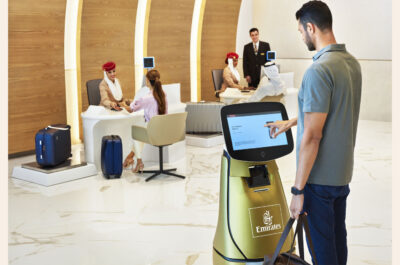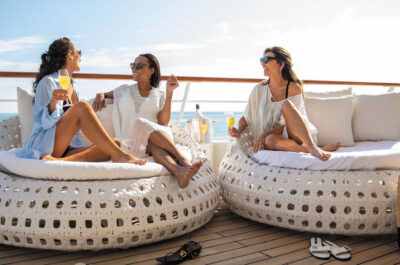Terrestrial broadband network key and enabling connected ships to consume 200 GB per average port visit. MTN also saw a dramatic shift in devices used for connectivity on its customer ships. In 2010, the breakout of devices used to purchase and access the Internet were 94% desktops or laptops, 5% tablets, and 1% mobile phones.
MIRAMAR, FLA. – In preparation for the Cruise Shipping Miami 2015 Show, MTN Communications (MTN) announces statistical results of its two-year transformation of at-sea connectivity.
The statistics are the product of an unmatched customer toolset MTN rolled out starting in 2012:
- The industry’s first hybrid satellite and terrestrial broadband network for improved bandwidth delivery.
- An Internet billing method akin to land-based resorts for increased revenue growth.
- An Internet Cafe solution delivering seamless access at sea through any device and offering shared plans with improved management of data consumption.
“The cruise industry competes with the land-based resort industry,” said Brent Horwitz, senior vice president and general manager, cruise and ferry services, MTN. “But when it came to communications, due to satellite technology limitations and costs, passengers and crew got slow Internet that was expensive compared to what they were used to at home.”
MTN also saw a dramatic shift in devices used for connectivity on its customer ships. In 2010, the breakout of devices used to purchase and access the Internet were as follows:
- 94% desktops or laptops
- 5% tablets
- 1% mobile phones
In 2014, the device split changed dramatically to:
- 60% of those connected were on mobile phones
- 20% on tablets
- 20% on desktops or laptops
The industry’s response to this and the exploding demand for data was to “increase the pipe” by adding bandwidth to ship service plans.
“Satellite connectivity comes at a high price, though, so operators continued to challenge the industry to improve the passenger and crew Internet experience, decrease credits issued and increase revenues,” Horwitz said.
Industry-First Hybrid Satellite and Terrestrial Broadband Network
“MTN was first to market with a way to ‘push more data through the pipe on cruise ships faster,'” Horwitz said.
By launching the MTN Terrestrial Broadband Network (TBN), the company introduced the industry’s first hybrid network of satellite and terrestrial connectivity. Four major cruise operators leverage the MTN TBN today, and have for three years. Made up of access points at 29 of the world’s busiest cruising ports, the MTN TBN switches ships from satellite to terrestrial connectivity seamlessly using a suite of patented and patent-pending technology. The experience is equal to mobile users moving from one cell tower to another. Switching to the MTN TBN enables faster Internet speeds and higher reliability. The MTN TBN has the capacity to deliver 588 GB per hour in all connected ports. Vessels have exceeded speeds of 50 Mbps downstream at one time, consuming 175-200 GB of data per average port visit. The average in-port capacity is more than five times that of a vessel with 10 Mbps of satellite capacity, and almost seven times that of a ship with 7 Mbps of satellite capacity. MTN TBN connectivity lowers costs and increases network performance, improving service quality and generating increased revenues.
“A great testament to the MTN TBN is where operators are able to offer crew ‘in-port pricing’ with speeds and costs that match shoreside alternatives,” Horwitz said. “Crew can affordably video-call home, download media or access other high-bandwidth services in port before they get off the ship to relax. Meanwhile, ship IT staff get access to satellite connectivity that would have otherwise been used up by crew and passengers. This allows for system updates and ship-to-shore training sessions before they have to head back to sea.”
Cruise Ship Internet Billing Shifted to that of Data Usage on Land
MTN shifted Internet pricing so passengers and crew are billed per MB versus per minute. Users can browse web sites as long as they want now, leisurely read email, or wait on a text reply without paying more. The company also eliminated the need to keep logging on and off. This consumption-based shift increased usage and improved the experience dramatically on ships MTN serves. As a result, operators saw Internet refunds decrease >50%.
Internet Cafe Solution Delivering Seamless Access at Sea through Any Device
The company also enhanced its Internet Cafe solution onboard ships. Passengers and crew can use any device to seamlessly connect to the Internet in an integrated fashion. This enables operators to better manage data consumption. MTN rolled out this enhanced platform as a tool for passengers and crew to monitor and self-regulate their Internet usage.
Benefitting the Customers of MTN Customers
“Cruise passengers and crew have reported back that their connectivity experience at sea has improved significantly over the past two years,” Horwitz said. “The cost of connectivity may never fully come down to where it is on land, but passengers demand – and deserve – more value for the amount of money they pay. This increases consumption, which drives operator revenues.”
In a Cruise Shipping Miami 2015 panel on March 18, 2015 titled, “Get Connected – How Leaps in Broadband Connectivity May Transform Cruising,” Horwitz plans to remove the word “may” from the equation, sharing the following two-year operator statistics:
>500% in MB consumption
>50% decrease in refunds issued
>35% increase in Internet revenue
>40% increase in users
Crew stats included:
50% increase in MB per user
>30% increase in revenue
>35% increase in user rate
“MTN was in an unmatched position to take this transformative leap by evolving its network into a hybrid design, shifting its billing model and extending its Internet platform in a way that better manages the explosion of devices now onboard ships. The statistics we are sharing illustrate the power of our network, a team made up of employees who have been the customer, and solutions created around our obsession for onboard satisfaction and revenue-generation.”
Photo caption: WiFi onboard (Costa Cruises).
Theodore is the Co-Founder and Managing Editor of TravelDailyNews Media Network; his responsibilities include business development and planning for TravelDailyNews long-term opportunities.


































































































































































































